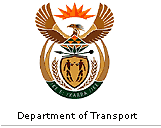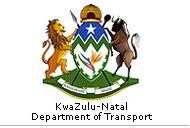 |
Sugar MillingThe South African sugar industry is one the most important
agricultural sectors of the national economy, and is
a very important part of the KZN provincial economy.
The industry provides about 350, 000 jobs and approximately
one million people, most of them in rural areas, are
dependent on the sugar industry in some way.
The annual turnover of the industry is about R 5-6 billion
per year depending on rainfall.
The sugar industry in KwaZulu-Natal usually produces a
crop of 20 million tons of sugarcane annually, which
translates into approximately 2.0 million tons of sugar.
Approximately 80% of the South African industry is located
in KwaZulu-Natal with the balance being situated in
Mpumalanga.
There are 12 sugar mills in KwaZulu-Natal, located at
Umzimkulu, Sezela, Eston, Noodsberg, Dalton, Maidstone,
Gledhow, Darnall, Amatikulu, Felixton, Umfolozi
(Riverview) and Pongola.
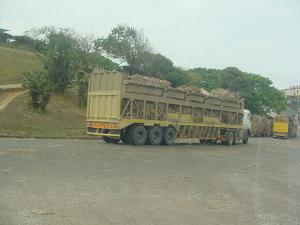
Sugar cane on road
|
Due to the difficult terrain and relative costs of labour
and capital, harvesting of sugarcane in KZN is still
mainly done by hand, with only a small number of mechanical
harvesting operations in the industry. The hand harvesting
is done by farmers with own labour, or by harvesting
contractors that also provide in-field transport to
loading zones.
The in-field transport of sugarcane in KZN is mainly
performed by road using tractor combinations of various
sizes, many of them with self-loading gear. Many cane
farming operations use tractors in-field and then tranship
with cranes to larger road units (either tractor
combinations or truck-tractor-semi-trailer combinations)
for the transport to the mill. Many of the road operations
are operated by professional carriers or farmer
cooperative groups.
There are only two mills - Riverview and Felixton - that
use rail for some cane haulage. Umfolozi has a system
of narrow gauge rail lines and locomotives operated by a
farmer cooperative that hauls cane in small wagons from
field to mill. Felixton mill receives 350,000-400,000 tons
per annum by standard gauge rail trucks from the Nkwalini
area. The mill was designed to receive 80% of the cane
supply by rail, but the railway operator has gradually
reduced the service to the current levels. Cane
from the new developments in the Mkuze area is being
transported by a large new fleet of interlink vehicles to
Felixton mill. If there is ever a need to revert to the use of rail
transport there will be very significant capital
requirements, as most of the mills have removed all the
infrastructure for transhipment from road to rail and for
sugar loading onto rail and, in some cases, developed
storage and handling facilities that are not accessible by
railways.
The sugar produced at the KZN mills is all transported in
bulk tankers by road to the sugar terminal and refinery in
Durban with the exception of some mills that do their own
packing and distribution. The only mills using rail
transport for sugar are Felixton and Amatikulu.
All molasses is transported by road from the mills to
Durban except for Amatikulu and Felixton.
The annual tons produced by the mills in 2006 is shown in
the table below.
Umzimkulu MillThe Umzimkulu Sugar Mill is situated on the south bank of
the Umzimkulu River on the outskirts of Port Shepstone.
The cane deliveries are 100% by road, with 1.16 millions
tons of cane being delivered from growers who are mainly
within a 30-35 km radius.
Due to the closeness to the sea, the growing area is all
inland from the mill, stretching as far as Harding and
with some new areas in the Transkei.
Rationalisation of the cane transport has resulted in 93%
of deliveries being in larger spiller vehicles and only 7%
of cane being received in bundles.
The mill produces annually 110,000 tons of sugar and 40,000
tons of molasses, which are transported by road to Durban.
Sezela MillThe Sezela Mill is located on the south coast
approximately 70 km south of Durban along the N2 route.
Annual mill crush is 2.08 million tons of cane from which
210,000 tons of sugar is produced. The mill produces
87,000 tons of molasses and 21,000 tons of furfural as by-
products of the sugar production process.
All transportation is done by road. Cane is transported
within a radius of 0-135 km with an average haul distance
of 38 km.
Although the mill has very convenient rail facilities off
the South Coast main line, sugar, molasses and furfural
are all transported by road to Durban, and inbound
deliveries of coal are also received by road.
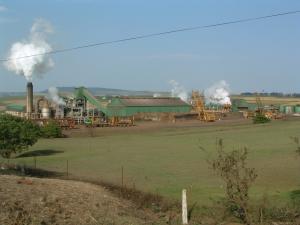
Eston Mill
|
Eston MillThe Mill at Eston is the newest in the KwaZulu-Natal sugar
industry, having been commissioned in 1995 to replace the
old mill at Illovo.
The Eston Mill crushes about 1.26 million tons of cane
and produces 125,000 tons of sugar per annum.
All cane deliveries are received on road from growers
within about a 0-58 km radius. Average haul distance is
about 22 km. There are no rail linkages to this mill, which
was designed to receive cane only by road.
All sugar and the 51,000 tons of molasses are delivered by
road to Durban. Noodsberg MillThe mill at Noodsberg (near Dalton) in the KwaZulu-Natal
Midlands crushes about 1.45 million tons of cane and
produces 150,000 tons of sugar per annum.
The cane supply area stretches as far as Baynesfield to
the west (55 km)and includes 55,000 tons from the Muden
area (70 km) and 90,000 tons from Kranskop area (60 km).
All cane transport is by road, and all inbound coal has
been switched to road transport.
The mill is adjacent to the Dalton-Glenside rail
line, and about 80,000 tons of white sugar are railed to
Germiston in dedicated bulk sugar tankers.
The balance of 170,000 tons of sugar and 70,000 tons of
molasses is transported to Durban by road. Dalton MillThe sugar mill at Dalton is unique in KwaZulu-Natal in
that it processes both sugarcane into sugar and wattle
bark into tanning extract during the sugar off-season.
Approximately 700,000 tons of cane are crushed, producing
65,000 tons of sugar.
30,000 tons of sugar are delivered to the Noodsberg mill by
road and the balance of 70,000 tons is transported by
road to Durban.
The mill has rail facilities and, at one time, the transfer
of sugar from the mill to Noodsberg was done by rail as
well as the transport to Durban. All rail operations have
been abandoned due to withdrawal of services.
The Dalton mill is one of two tanning extract factories
in KZN, and receives bark delivered by growers throughout
the Midlands, Southern KZN and the Melmoth area. 60,000
tons of wattle bark are processed annually.
In addition, there is a maize mill with a production of
30,000 tons of meal per annum, packed mainly for
distribution into the rural areas in the KZN midlands.
Maidstone MillThe sugar mill at Maidstone was originally built on the
banks of the Amanzimnyama river near the town of Tongaat,
but due to expansion and failing water supply it was
relocated to the present site on the north bank of the
Tongati River about 40 km north of Durban.
Cane supply area to the mill includes the farming area of
Nwedwe, local cane growers and a large miller-cum-planter
company with extensive estates within about 30 km of the
mill. The mill group area includes a large area of newly
emergent farmers that were established with the assistance
of the milling company. Maidstone mill receives most of the
cane that used to be delivered to the abandoned Mt
Edgecombe mill from areas stretching as far as Umlaas
Road and Shongweni.
The mill crushes 1.34 million tons of cane to produce
about 135,000 tons of sugar per annum.
All cane deliveries and all sugar transport to Durban is
done by road.
The Maidstone Mill has the advantage of both a milling
train and a diffuser, giving flexibility of crushing rate.
The mill supplies molasses and bagasse as by-products to
the adjacent animal feeds factory, and used to supply power
and live steam to the textile factory on the south bank of
the river.
Gledhow MillThe Gledhow mill and estates was the first complete sugar
planting and milling company in South Africa to be bought
out by a BEE firm.
The mill is located near the town of Stanger on the KZN
north coast with water supply from the Umvoti river.
All cane deliveries are by road, with the bulk of the cane
being produced within about a 30 km radius of the mill.
The furthest cane is in the Kranskop area (65 km) Glendale
Valley and the Doornkop areas.
The mill incorporates a refinery section, and produces
white and brown sugar for direct delivery to wholesalers
and retailers all over the province.
Gledhow Mill crushes approximately 1.2 million tons of
cane and produces 110,000 tons of sugar per annum.
The mill has a packing operation, and delivers bagged sugar
direct to customers in the Durban area.
The mill supplies bagasse (sugar cane pith) to a large
paper mill built adjacent to the sugar factory. The main
products of the paper factory are tissue, but a range of
papers is produced. Darnall MillThe Darnall Mill is situated on the Old North Coast road,
about 20 km north of Stanger.
The cane supply area to the mill area stretches from the
sea on the east inland to as far as Mapumulo, with haul
distances of 0-76 km. The mill group area is bounded by
the Tugela river to the north and the interface with
Gledhow to the south.
The mill crushes 1.2 million tons and produces about
110,000 tons of sugar per annum. All cane, sugar and the
50,000 tons of molasses is transported by road.
As a by-product, the mill produces about 18,000 tons of
bagasse fibre that is transported to Tongaat by road. Amatikulu MillThe Amatikulu Mill, located about 10 km to the south of
Gingindhlovu, crushes about 1.5 million tons of cane per
year.
Cane deliveries are received from growers on a large
variety of vehicle types from an area that stretches from
the sea to Entumeni and Eshowe areas with haul distances
of 0-80 km.
The mill produces about 150,000 tons of sugar which are
railed to the terminal in Durban in bulk rail tankers.
The 60,000 tons of molasses and the incoming coal have been
railed in the past but may be transported by road in 2007.
In addition, 30,000 tons of fibre are transported by road
to Tongaat as input to the animal feed plant.
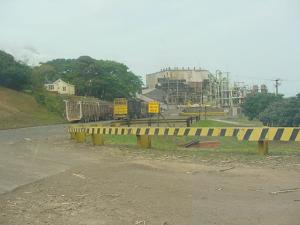
Felixton Mill
|
Felixton MillFelixton Mill is located on the North Coast , about 16
km south of Empangeni.
The mill crushes 2.1 million tons of cane and produces
220,000 tons of sugar per year.
Felixton Mill is unique in that it is the only mill in
the industry specifically designed to receive the major
proportion (80%)of cane supplies by rail. Present
deliveries of cane by rail are only about 400,000 tons from
the Nkwalini branch line due to withdrawal of service by
the railways. The new developments in the Mkuze area are
being handled
by road transport.
The estimated potential tonnage that could be attracted to
rail is about 1.3 million tons per year.
The annual output of sugar is transported to the terminal
in Durban in bulk rail tankers, and the 84,000 tons of
molasses are transported 50% by rail and 50% by road. Umfolozi MillThe Umfolozi Mill is located about 4 km south of
Mtubatuba. The mill crushes about 1.1 million tons of
cane and produces 120,000 tons of sugar per year.
Umfolozi is unique in the industry in that a large
proportion of the cane is received on narrow gauge rail
line (605,000 tons) and the balance of 450,000 tons on
road. The mill also receives about 60,000 tons of chopped
cane delivered direct from chopper harvesters.
Transport of sugar is split between 96,000 tons of bulk
and 60,000 tons of packed sugar, all of which are
transported by road. 49,000 tons of molasses are
transported to Durban by road. Pongola MillPongola is situated on the N2 north route, close to the
Swaziland border in the fertile, irrigated Pongola Valley.
The mill crushes 1.4 million tons of cane, all of which is
delivered by road, from growers within a 15-40 km radius.
The deliveries include some cane from the south around the
Jozini area.
Pongola mill also receives about 10% of deliveries as
chopped cane delivered direct from the mechanical
harvesters.
The 152,000 tons of sugar is refined at the mill and
delivered in packaged form to Durban (60,000 tons) and the
Gauteng region (92,000 tons), by road.
51,000 tons of molasses is transported to Durban by road.
|
 |
